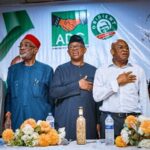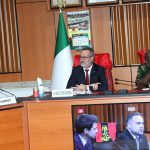In novel move to stabilise the nation’s volatile exchange rate, the Central Bank of Nigeria has ordered Deposit Money Banks to sell their excess dollar stock latest February 1, 2024.
Amid soaring inflation of 28.92%, DAILY COURIER reports that the Naira is teetering towards a record-low against the US dollar as the exchange rate fell to over N1,480 per dollar.
Amid soaring inflation of 28.92%, reports have it that the Naira is teetering towards a record-low against the US dollar as the exchange rate fell to over N1,480 per dollar.
The CBN, which made the disclosure in a new circular released on Wednesday, also warned lenders against hoarding excess foreign currencies for profit.
According to officials, the central bank believes some commercial banks hold long-term foreign exchange positions to enable them profit from the volatile movements of exchange rates.
The Central Bank of Nigeria (CBN) has released a new circular addressing suspected cases of excessive foreign currency speculation and hoarding from Nigerian banks.
The new circular introduces a set of guidelines aimed at reducing the risks associated with these practices.
The circular, titled “Harmonisation of Reporting Requirements on Foreign Currency Exposures of Banks,” highlights the CBN’s concerns over the growing trend of banks holding large foreign currency positions.
“The Central Bank of Nigeria (CBN) has noted with concern the growth in foreign currency exposures of banks through their Net Open Position (NOP). This has created an incentive for banks to hold excess long foreign currency positions, which exposes banks to foreign exchange and other risks. Therefore, to ensure that these risks are well managed and avoid losses that could pose material systemic challenges, the CBN issues the following prudential requirements”
The central bank from the above believes some commercial banks hold long-term positions in forex with the hope of profiting from it especially when there are forex fluctuations.
Commercial banks in Nigeria have profited massively from forex revaluation gains since 2023.
As such, most analysts believe some of the banks may be deliberately buying forex and then holding it long enough to sell when it depreciates.
In some cases, some banks can buy forex from the CBN with plans to sell to customers but they do not sell and instead hold the forex. Once the currency depreciates, they make money.
CBN Guidelines
To address these issues, the CBN has issued prudential requirements that banks must follow. A key focus of these requirements is the management of the Net Open Position (NOP).
The NOP measures the difference between a bank’s foreign currency assets (what it owns in foreign currencies) and its foreign currency liabilities (what it owes in foreign currencies).
The circular mandates that the NOP must not exceed 20% short (owning more than owning) or 0% long (owning no more than the bank’s shareholder funds not reduced by losses) of the bank’s shareholders’ funds.
This calculation must be done using the Gross Aggregate Method, which provides a comprehensive view of the bank’s foreign currency exposure.
Furthermore, banks with current NOPs exceeding these limits are required to adjust their positions to comply with the new regulations by February 1, 2024.
Additionally, banks must calculate their daily and monthly NOP and Foreign Currency Trading Position (FCT) using specific templates provided by the CBN.
Other demands
The circular also stipulates that banks should maintain adequate stocks of high-quality liquid foreign assets, such as cash and government securities, in each significant currency.
Senate summons CBN governor over state of economy, Naira.
Meanwhile the Senate, on Wednesday, summoned the Governor of the Central Bank of Nigeria (CBN), Olayemi Cardoso, over the state of the economy and free fall of the Naira.
Chairman of the Senate Committee on Banking, Insurance, and Other Financial Institutions, Senator Tokunbo Abiru, issued the invitation after a meeting of the Committee in Abuja, on Wednesday.
Speaking with newsmen on Wednesday, Abiru said, “We have held a meeting this afternoon essentially to focus on the direction of the Nigerian economy.
“We are all living witnesses of what is going on. Underlining the major issue of the economy is the way the inflation index has been and of course, it is a major concern to us.
“We have deliberated among ourselves. Critical issues were addressed and we believe that the next line of action is to summon the Governor of the Central Bank of Nigeria on Tuesday, at 3 pm to brief us properly on the state of the economy.
“That we have resolved and will communicate to the Governor of the Central Bank after which we will have further communication with members of the press.”











